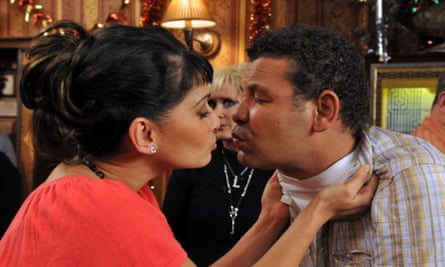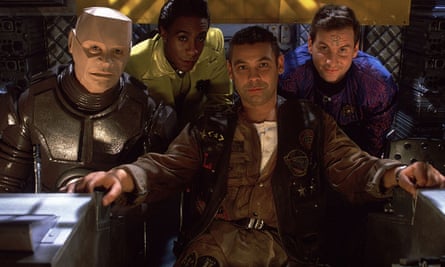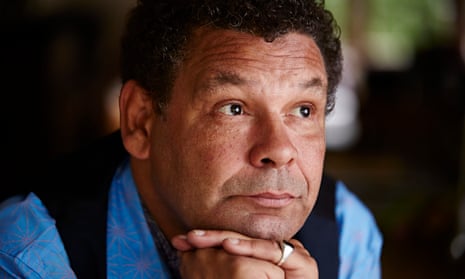Craig Charles’s house might rest on the edge of Premiership footballer territory, just south of Manchester, but he’s not getting ahead of himself.
“We’re the poor relations,” he says with a grin – actually, he says most things with a grin – when I arrive there. Of course, “poor” is a relative concept – Charles’s home has an indoor swimming pool and an Aga, which means he can make me a tea (served in an old Red Dwarf mug) despite the fact there’s currently a power cut on his street. (“They’ve got eight hours to do the work, otherwise they’re paying for my frozen goods!”) But if what Charles is getting at is a feeling that he doesn’t quite fit in here, then it’s one he’s probably used to by now.
Son to an Irish mum and West Indian dad, he grew up on the Cantril Farm estate in Liverpool with “a thousand white families and us. We couldn’t help but stand out. Liverpool was quite a racist place in the late 60s.”
His CV is full of relative oddities, too; TV and radio gigs you might suspect would be interesting niche items or straight-up flops, that have gone on to be huge hits. Robot Wars, in which Charles enthused wildly about wonky homemade robots blowing each other up, became one of the biggest shows on BBC2 at the time. Takeshi’s Castle, in which Charles enthused wildly (you might spot a theme here) about Japanese gameshow contestants diving headfirst into rocks, was a huge cult hit. The Craig Charles Funk and Soul Show on 6 Music now boasts 250,000 listeners, making it one of the most popular shows on the station. Even Red Dwarf, the show that made Charles’s name as Lister, the last human in the universe, was hardly a mainstream proposition; everyone said sci-fi and comedy couldn’t mix. It broke ground in other ways too, being one of the first TV shows to feature black characters who didn’t discuss race. “We’ve done it for 30 years nearly and the colour of our skin hasn’t been mentioned once,” says Charles. “Black comics will talk about being black, and I think that’s important to their comedy. But we tried to take it out of that racial lineage. Kind of the opposite of Richard Pryor when he said – and I’ll clean this up for you – ‘Anyone seen that new show set in space? Logan’s Run? Ain’t no blacks in it … someone’s planning on us not being around!’”
While traversing this varied career, Charles has dealt with what masters of understatement might describe as “highs and lows”. In 1994, he spent several months in Wandsworth jail before being acquitted of a rape charge. In 2006, shortly after taking on a new role as Northern Soul-loving cab driver Lloyd Mullaney in Coronation Street, his driver sold pictures of him smoking crack in the back seat to the tabloids. Last year, he had to abandon his appearance on I’m a Celebrity … after learning that his older brother, Dean, had died. Currently, he’s promoting Craig Charles Funk & Soul Classics, a collection of old and new tracks tied in with his radio show that has its roots in his childhood.
“At school I would hang out with hippies in denim jackets smelling of patchouli,” he says. “I’d play their Thin Lizzy or Led Zeppelin records and when my dad heard them he would say ‘He stole ’dat ting from John Lee Hooker!” and play me the old blues records: Muddy Waters, BB King, Robert Johnson.”

Charles says that, at home, the radio or record player was always on, and there was always dancing: his dad’s friends would arrive to play calypso and soca, drink rum and argue while the kitchen was full of “big black mamas, really heavy ladies, cooking curried chicken and roti”. The story in Charles folklore is that his mum and dad met outside a bording house with the sign that read: “No dogs, no blacks, no Irish”, which sounds neat to the point that you wonder if it’s …
“A bit contrived?” he jumps in, laughing. “I’m not sure if it’s true to be honest. They probably just didn’t want to tell their kids they met in a shebeen on Granby Street at 4am, pissed out of their heads.”
As a teenager, Charles displayed a gift for spoken word – another way to make himself stand out in working-class Liverpool, and he used his quick wordplay to talk himself out of sticky situations – “Making people laugh and charming them,” as he puts it, which is basically what his job title is these days. Buoyed by a rising punk poetry movement that included the likes of John Cooper Clarke and Attila the Stockbroker, he began to make a name for himself on the burgeoning Liverpool alternative scene.
It was an exciting time, with many Scouse bands – the Teardrop Explodes, Frankie Goes to Hollywood and Echo and the Bunnymen – making inroads into the mainstream. Charles was originally in bands himself: his group were due to play at the Temple club one night when it got cancelled because Teardrop Explodes needed it for a four-night homecoming gig. He was so pissed off, he leapt up on stage before the band was due on and recited a poem about their singer Julian Cope. It’s a poem he can still rattle off in full now, and he does so at manic speed, ending with a flourish: “Ladies and gentlemen, the Teardrop Explodes!”
Even when he started getting booked and recording Peel sessions, Charles knew he stood out – everyone else was white, and singing with a band behind them. But he was used to it, and used it to his advantage, commenting on the brutality of the Thatcher government and the relentless stop and search he had to endure at the time. He even performed a poem about police harassment on Saturday Night Live, which must have made it strange for him when his brother Dean ended up joining the force.
“Very strange!” he says. “Quite weird, actually. But quite handy as well. ‘Dean, I’m at the station here, can you help me out …’” He lets out a big laugh, but it’s a joke with an edge, given that Charles has spent time inside. I ask if he turned to music during that dark spell.

“Not really, no,” he says. “I was just reading. They called me ‘the horizontal con’, because I’d just lie on my bunk and read books.” He says his “gift of the gab” helped him out in a “very violent jail”, even though he was attacked at one point. “But only by some guy waiting for his meds to bring him down,” he shrugs. “A lot of people in there were mentally ill, really. And the smell … that was one of the worst things – I’m quite, cleanliness next to godliness and all that. Thousands of men locked up 23 hours a day, in a jail built for hundreds, all shitting in a bucket [‘slopping out’ wasn’t abolished in Wandsworth until 1996]. It’s gonna stink innit?” Did the experience make him stronger? “It made me not wanna go back!”
Perhaps a more unexpected rehabilitation came after his drugs scandal, given the out-of-touch moralising that often surrounds such incidents. Charles isn’t sure it’s that surprising he kept his jobs, saying he was “clearly unwell” and not coping with the recent death of his dad. Does he ever worry that such self-destructive urges might return?
“No,” he says instantly. “Well … they could. You have to be vigilant. I’m quite an addictive person. I just try and find healthier fixations and addictions. Work is one of them. People look at my schedule and go [he recoils in mock horror].”
I tell him that he doesn’t seem like someone who’s been through addiction and recovery. He’s bright-eyed and bouncy, and lacks the scary intensity or therapy-speak. “I know exactly what you mean by that,” he says. “I did go to a few of those meetings. And I decided that if that’s the sobriety that you’re offering then … can I have a pint please?!” He laughs uproariously, but he means it: he has even installed a bar in his house. “I know that stuff works for some people but I just had to find myself again. I did it for my kids and my wife and family and for me and my legacy … to make sure that by the time I shuffle off this mortal coil it won’t be what defines me.”
Charles can seem perma-cheery, so it must have come as a shock to some people to find out he had a dark side.
“I dunno if it’s a dark side,” he says. “It’s just wanting to get smashed out your head sometimes ... doesn’t everyone want to get smashed out of their head sometimes? It just depends what you take … and I was taking illegal substances in the back of my friend’s car, who was also my driver, and he stitched me up and sold me out to the papers. In a way it was probably the best thing that happened to me.”
Coronation Street stuck by him and he’s been a fixture for the last decade, but Charles leaves the show at the end of the month, a decision he says was partly prompted by Dean’s death. “I thought: ‘Things could all be over tomorrow. Do I sit back and be in Corrie for the rest of my life? Or is there more I want to achieve?’ And the truth is there’s more I wanna do, with my poetry, my music, acting …”
He’s certainly loading up the schedule that so terrifies his friends. In November he starts filming the 11th and 12th series of Red Dwarf – he has stopped drinking to get in shape, which, given Lister’s famous love of lager and curry, seems somewhat ironic. Before that he’s turning one of his “epic poems”, Scary Fairy and the Tales of the Dark Wood, into a 35-minute piece of stop-frame animation. And then there’s the music: DJ dates that have him performing so energetically that he keeps coming home with strains (“I’m 51, I shouldn’t be getting disco injuries at my age!”) and this compilation, which he’s proud of because it refuses to plump for the obvious tracks.
“What I don’t like is these radio stations, if they’re going to play Stevie Wonder they’ll play Superstition or one of the five tracks they’ve got in the system,” he says. “There’s a vast catalogue of music out there to discover, and it’s all new music if you haven’t heard it before. So we’ll put a Bill Withers song on there, but it’s not Use Me, it’s Grandma’s Hands.”
It seems no matter what he does, Charles is always going to have to stand out a bit from the crowd.
Craig Charles Funk & Soul Classics is out now on Sony Music

Comments (…)
Sign in or create your Guardian account to join the discussion